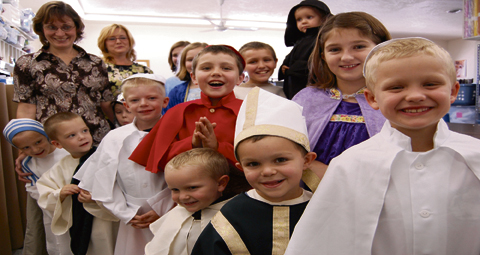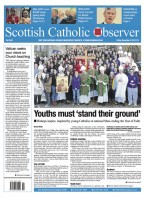November 1 | ![]() 0 COMMENTS
0 COMMENTS ![]() print
print

Strong in faith – A weekly discussion chaired by young Catholic students
DISCUSSION: How should we approach Halloween as Christians?
In the same way Jesus associated with the pagans and ‘sinners’ of His day: with love and humility. It’s a person’s heart that matters not whether or not they dress up on October 31. Maybe this Sunday’s reading could be read: ‘I thank you God that I am not sinful like these people dressed up as ghosts and witches.’
Sharon McNamara
Firstly, as the Vigil of All Saints. But also, we should recognise that the Church has always Christianised whatever She could in pagan culture. Even if that has been largely forgotten, Halloween can still be embraced in a Catholic way.
Our secular society lurches from an irrational denial of any spiritual realities on one hand, to an irrational superstition on the other—it needs the fides et ratio of Catholicism. We should always aim to take what is good in any culture and bring it to Christ.
On the one hand, some atheists seem to think that the fact that the Church adapted some pagan symbols, and even temples, ‘proves’ that Christianity is false, while on the other hand some, though not all, in the Reformed ecclesial communities see this same fact as evidence that Catholicism is a perversion of Christianity—and I think it is from these quarters that most complaints about Halloween from Christians emanate. Both fail to realise that grace does not obliterate nature but perfects it, and that everything good in creation and history finds its fulfilment in Christ.
Gerald Bonner
Some see Halloween as harmless fun for young and old if put in Christian context, but increasingly some schools, parishes and church related groups opt for a ‘saints’ party rather than a traditional fancy dress do.
Scottish Catholic Observer
Completely ignore it.
Eoghan Martin
Celebrate it as All Hallows Eve, maybe dress up as a saint.
Hannah Hartley
—Have your say at http://www.facebook. com/scostronginfaith
Look at Halloween through the light of Christ
By Aidan Michael Cook
It is often thought that
Halloween is just a pagan festival, but in fact it has many Christian roots. The word itself comes from All Hallows evening or the first evening of All Saints’ Day. The celebration of a great feast day begins the night before, and so the celebration of All Saints day begins on October 31.
But just because Halloween has Christian roots does not mean that we should uncritically accept everything that goes with it in its current form. Combining the Christian and the secular always involves careful discernment.
Halloween in a Christian context should certainly not be seen as an excuse to dress up in skimpy outfits—fancy dress? Sure, but the normal standards of modesty still apply… Our Christian faith has to permeate everything that we do and
cannot simply be put aside for a night so we can be like everyone else.
But approaching Halloween from a Christian perspective is not just about avoiding certain things. It is also about looking at it in the light of Christ and seeing what good we can gain from it.
Halloween in its current ghosts-and-witches form can serve as a reminder of the souls who do not become saints, and of all the evil in the world. It is a reminder that not all is right in the world, and that to become one of the saints we celebrate that day involves a battle, one that has ultimately been won by Christ but that still requires us to ‘fight the good fight.’
It is not just a gloomy picture though. After all, Halloween is not a celebration of evil but a mockery of it. On All Saints’ Day, we celebrate all those who have gone before us and won, so that we can look at Evil and say: ‘you did everything you could to stop them and yet they still beat you, and we will do the same! All this evil and temptation hasn’t fooled us. We know you lose—we are not afraid!’
As St Thomas More wrote of the devil: ‘the proud spirit cannot endure to be mocked.’ Making fun of evil (above), we can put it in its place, not as any less serious, but rather as something that, hoping in God, we know to have been overcome. Indeed, it is precisely when Halloween’s ghoulishness is no longer seen as funny that it starts to become dangerous.
It is also true that this danger should not be underestimated, and so it is by no means wrong to decide to avoid modern
Halloween altogether. What is clear is that no matter what approach we take, we must do so with discernment, faith, and hope in the victory of Christ over death.











